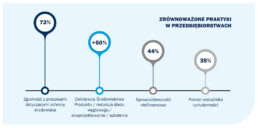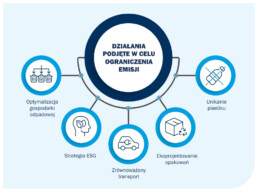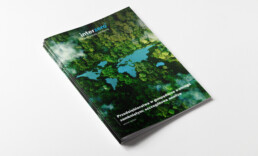Businesses in the Circular Economy: A Detailed Analysis
The pursuit of sustainable development is not only a moral responsibility, but also the key to long-term success for businesses. In times of climate crisis and growing customer and investor expectations, companies must take active steps to reduce their impact on the environment. The transformation towards a circular economy (CE) is becoming a priority, offering numerous business benefits such as cost reduction, reputation improvement and increased innovation. These are the conclusions of our latest study " Circular Economy Businesses: A Detailed Analysis". .
Do you know that...
.... significant most companies want to implement sustainable initiatives or have already started the process? Such declarations were made by 71.1 to 84.9% managers representing medium and large companies from 6 European countries. The increase in public awareness of lifestyles and consumption patterns is causing businesses, institutions and government bodies to recognise the need for an inevitable change in strategy and to adopt new
direction.
ONLY 4% OF COMPANIES WILL NOT INVEST IN SUSTAINABILITY
More than 4 in 10 companies (41.8% of managers surveyed by Interzero) will invest up to €150,000 in sustainability over the next three years (23.9% up to €50,000 and 17.9% up to €150,000). More than half (53.9%) will spend more than €150,000, and more than 2 in 10 (24%) more than €500,000.
What motivates companies to implement sustainable solutions?

Process efficiency is the main driver of implementing sustainable initiatives, followed by communication considerations and the company's image in the eyes of stakeholders. Taking these motivations into account, the rest of the analysis focused on a group of companies selected due to the type of sustainable initiatives they undertake. For this purpose, an in-depth analysis was carried out, which showed that the most common practice is the verification of compliance of the conducted activities with environmental protection regulations (72% of companies).
How do we minimise the negative impact on the environment?
Understood in this way, limiting the impact of a company's activities on the environment is a valuable competitive advantage. Among the actions taken to achieve this goal, respondents most often declared reducing emissions, optimizing waste management, avoiding plastic, eco-designing packaging and developing an effective ESG strategy.

Interzero Research: Status, Needs and Trends in the Circular Economy
Interzero supports companies in adapting to sustainable business models through comprehensive consulting and innovative environmental solutions. Our report presents the results of a study on sustainable development trends, market expectations and related business decisions of medium and large enterprises in Europe. Six countries were analysed: Italy, Austria, Poland, Slovenia, Croatia and Serbia.
The aim of our study was to:
- Understanding and analysing market trends in the circular economy and sustainable development
- to investigate possible barriers to the application of best practices in the individual countries covered by the study
- to investigate the main sustainability needs of medium and large companies in the countries covered by the study and to analyse their readiness to adopt sustainable business models
- creating a reference point for the state of development of ecological transformation in business models at the European level by summarizing data obtained from all analysed countries

Fill in the form to read the full report:
You will receive a report in pdf format at your email address. We encourage you to take a look at the results. Do you have questions about the report? Need help setting up a sustainability strategy for your company?
Write to us at the email address below!